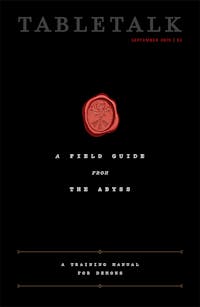
Request your free, three-month trial to Tabletalk magazine. You’ll receive the print issue monthly and gain immediate digital access to decades of archives. This trial is risk-free. No credit card required.
Try Tabletalk NowAlready receive Tabletalk magazine every month?
Verify your email address to gain unlimited access.
In Exodus 19, God called His people to prepare to meet Him at Mount Sinai, where He would give them the law. On that solemn occasion, they were not allowed even to touch the mountain. Hebrews 12:22–24 reminds us that we have not come to such a mountain:
But you have come to Mount Zion and to the city of the living God, the heavenly Jerusalem, and to innumerable angels in festal gathering, and to the assembly of the firstborn who are enrolled in heaven, and to God, the judge of all, and to the spirits of the righteous made perfect, and to Jesus, the mediator of a new covenant, and to the sprinkled blood that speaks a better word than the blood of Abel.
If the people were commanded to prepare themselves before receiving the old covenant at Sinai, how much more should we prepare to meet the Lord each week for His greater new covenant blessing?
The Lord has specifically set aside one day in seven that we may worship and enjoy Him as we rest from our labors. God Himself exhibited a pattern of work followed by rest, and He weaved this pattern into the fabric of creation. From the beginning, God’s people were called to rest and worship on the seventh day. We are also called to rest from our labors and worship one day of the week, though the pattern flipped after the resurrection of Christ. We worship on the first day of the week, moving from rest to work on the following six days. Such is the great privilege of living in the resurrection power of Christ. This affects every moment of our lives and should move us to prepare to meet the Lord and experience the peculiar joy that is worship on the Lord’s Day.
Throughout the Week
Worship can take place in more than one context. Westminster Confession of Faith 21:6 says that individual believers should worship God “in secret.” This calls to mind Jesus’ statement that the Father who sees in secret will reward those who pray in secret (Matt. 6:6). Secret worship simply refers to a believer’s worshiping alone. In preparation for worship on the Lord’s Day, we may prepare by reading the Scriptures, by meditation, and by prayer, especially for God’s blessing on the ministry of Word and sacrament.
The Westminster Confession also advocates daily worship in the context of the family. This is a tremendous opportunity to lead our children, who often need special guidance to prepare for worship on Sunday. If you know the passage beforehand, you may read and explain the sermon text in advance of the service. Some churches publish the hymns for the upcoming service several days in advance to allow people to prepare for worship. This is especially beneficial for children, who may be unfamiliar with the tunes and lyrics. Worshiping as a family with an intentional focus on the Lord’s Day may draw each person closer to the Lord individually. That is because these contexts are connected to one another. Public worship guides secret and family worship while secret and family worship lead to public worship. Indeed, these are important spiritual ways in which we may prepare for public worship.
There are yet other, perhaps mundane, ways that we may prepare. We all know what it is like to try to finish errands at the last minute. It does not put us in a worshipful frame of mind. We should organize our affairs well in advance, knowing that our lifestyle choices may affect us on Sunday. If we stay up late on Saturday, we may not be alert and prepared to worship. Whatever we do throughout the week, our choices should be made so as not to provide a hindrance to worship.
On the Lord’s Day
While we should prepare for corporate worship Monday through Saturday, we may continue to prepare effectively on Sunday. One practical way to prepare is by waking early so as not to be in a hurry. Leave enough time to get ready at home and to arrive at the church in advance of the service.
When you arrive, take the time to greet other people (1 Peter 5:14). Corporate worship is the gathering of God’s people to worship as a body, not a collection of people individually engaging in secret worship. Remember why you have assembled. Even as you greet others, direct your thoughts toward worship, not on the events of the past week. While it may be tempting to catch up with friends, your thoughts should be focused primarily on serving the Lord and encouraging others in worship.
As you become situated before the service, you may continue preparing in more immediate spiritual ways. Many churches will have a prelude before the call to worship. This is an excellent time to meditate on the text that is to be preached. Contemplate what you have studied throughout the week and apply God’s Word to your life. Take this time also to pray to the Lord, asking Him to calm your heart and mind and to bless the ministry of Word and sacrament.
Preparing for worship may prove to be a great challenge. We are weak, frail, and affected by sin. It is all the more important that we discipline ourselves to overcome these influences. If worship on the Lord’s Day remains just another entry on the schedule, we will struggle to enjoy it. But if our lives are oriented around worship, we may experience a greater joy in gathering to worship the one true and living God.
